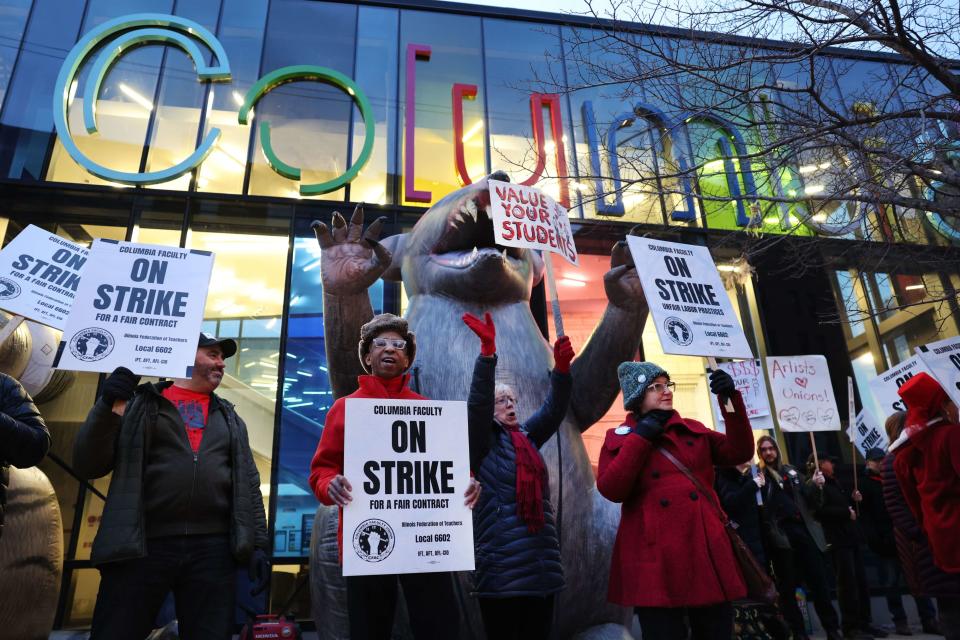Columbia College reaches tentative agreement with part-time faculty, ending historically long strike

Columbia College Chicago and its part-time faculty reached a tentative deal Sunday evening ending nearly two months of striking.
Diana Vallera, the Columbia College Faculty Union president and a photography professor, said in a statement that the agreement addresses many of the union’s concerns.
“This agreement makes important progress toward ensuring that Columbia puts students’ educational needs and faculty equity above profits, but there is still much work to do,” Vallera said.
Since Oct. 30, 584 adjunct professors have been protesting the administration’s decision to eliminate 53 already-enrolled classes weeks before the fall semester began and 317 course sections for the spring semester while increasing the size of other classes to cut costs. The strike was the longest adjunct faculty strike in higher education history, according to the union.
“We are pleased to announce that the college and CFAC, the Columbia part-time faculty union, reached a tentative agreement,” the Office of the President said in an email.
The email, signed by Vallera, union Vice President Lisa Formasa-Parmigiano, Columbia chief of staff Laurent Pernot and Terence Smith, special counsel-labor relations, marks a potential end to an unprecedented adjunct faculty walkout.
“It’s disappointing that the administration forced us to conduct the longest adjunct strike in history before they would bargain seriously,” Vallera said in the statement. “Our faculty are dedicated to our students and this college. We said all along that we would do whatever was necessary to stand up for what they needed, and we proved it. The strike brought faculty and students together in a powerful way.”
Details of the agreement will be provided after union members and college leaders vote on it Wednesday evening. If approved, the agreement will take effect immediately and adjunct faculty would resume teaching Jan. 2, after the college’s winter break.
The strike kept part-time faculty out of their classrooms for 49 days. Department chairs and some full-time faculty members took over for most part-time instructors’ classes, but several classes were at a standstill without an instructor until the semester ended Saturday.
Elizabeth Forkan, part-time professor of writing and rhetoric in Columbia’s journalism department, said the strike was a “total whirlwind.”
“I feel relieved and happy,” she said Monday. “We at least have something and now we can move forward with providing education to our students.”
Forkan, a Columbia College alumna, said many of her students had to decide whether to cross the picket line to go to their classes.
“I support my students continuing attending classes and getting the education that they sort of signed up to get,” she said. “I would never, ever interfere with a student from going to class.”
Over the past few weeks, there had been some tension between the part-time faculty and the full-time faculty, as well as the department chairs who stepped in to teach classes during the strike.
Joan Giroux, a full-time professor in Columbia’s art and design department, said she was supporting students and faculty navigating the the labor dispute.
“One narrative thread in the union’s effective messaging was that students come to Columbia for part-time faculty who are professionals active in their industries,” Giroux said. “The fact is, full-time faculty at Columbia College are professionals active in their fields.”
Giroux said full-time faculty took on extra classes to ensure that students could reach the end of the semester, which for some meant reaching graduation.
“This extra work made it harder to pursue ongoing professional projects,” she said. “I’m also looking forward to supporting the work the community will need to undergo rebuilding relationships across the college.”
Vallera said the contract provisions will ensure transparency and provide paths for collaboration with the administration.
According to the union, the program most harmed by cuts is communications, which will offer 62 sections of journalism, radio, advertising and related classes in spring 2024 compared with 92 sections offered in spring 2023. Cinema and television arts offered 259 course sections last spring, and have 191 slated for 2024.
Forkan said there are 57 students on a waitlist for writing and rhetoric classes in the spring. And as a result of the administration eliminating hundreds of sections, she isn’t teaching any as of yet.
“I can’t wait to get back there and help my students do the kind of work that they came to Columbia to do,” she said.

 Yahoo Finance
Yahoo Finance 